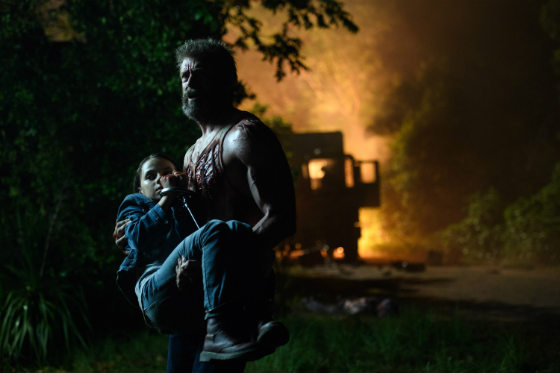Logan

Hugh Jackman and Dafne Keen in Marvel/Twentieth Century Fox's LOGAN.

Immediately evident in LOGAN’s dense backdrop of social commentary is the influence of Alfonso Cuarón’s CHILDREN OF MEN, a bleak future in which the fate of the species rests in the hand of one girl—in this case, a mutant of Marvel Comics lore. Set a little over thirty years into the future, the titular superhero (Hugh Jackman) finds himself in the Clive Owen role, reluctantly guaranteeing a refugee child safe passage to Eden—a fabled sanctuary established for the the victims of multinational biomedical corporation Transigen’s eugenics experiments.
For the first two acts, LOGAN entrenches our emotions on three fronts: 1. The plight of Transigen’s child test subjects, each of whom the peculiar mutant Laura (Dafne Keen) recalls by name. 2. Logan, a.k.a. Wolverine’s struggle with extreme age… The deceleration of his inhuman healing; he ages far slower than the average person—given his involvement in the Civil War, he’s approaching 200 years, at least. 3. Professor Charles Xavier’s (Patrick Stewart) neurological degeneration; now entering his 90’s, the loss of control over his Omega-class psychic powers causes what can politely be described as mindquakes with devastating consequence.
In each case, director James Mangold’s treatment grounds us in familiar terrors: U.S. exploitation of third world child labor; coping with the ravages of age; watching our loved ones disappear before our eyes as their minds break down, layer by layer, and their loneliness, their misplaced guilt of feeling burdensome on their families in their last stages of consciousness.
Hiding out at an abandoned industrial site in Mexico, Logan brings medications from America to help Charles control his destructive seizures, but cannot quell his loneliness.
Their exile is disrupted by Laura, whose rescuer leaves video of the inner workings of Transigen in the hopes that the last adult mutants will protect the children. Resembling a tiny Lukas Haas, Keen’s furrowed brow steals every scene from Stewart and Jackman. She doesn’t trust humans, and for good reason. Under the guise of a cancer cure, Transigen’s chief scientist, Dr. Rice (Richard E. Grant), attempts to create mutants from scratch. It is exactly the allegory you think it is.
Amidst the action-heavy plot, Logan, Xavier and Laura hide out on a farm. While the scene infuses some relatable humanity into the franchise, we meet the farmer Will Munson (Eriq La Salle, long removed from his Soul Glo days) roadside on a freeway dominated by self-driving rigs. Here Mangold and screenwriter Scott Frank (MINORITY REPORT, THE INTERPRETER) pepper the dialogue with commentary on industrial farming and high fructose corn syrup which, in a nod to Monsanto and Cargill, turns out to be a delivery system for Transigen’s experimental, rage-inducing, mutant soldier serum.
Weakened somewhat by the dependency on third-act violence, LOGAN overall is a timely vision of what superheroes might be in a world as unsteady as the one we presently inhabit. Mikhail Gorbachev, the architect of Perestroika, recently said in a TIME Magazine editorial, “It all looks as if the world is preparing for war.”
LOGAN show us the aftermath: the Earth we will depart, and the children who inherit the tragedy we are steadfastly determined to leave them.